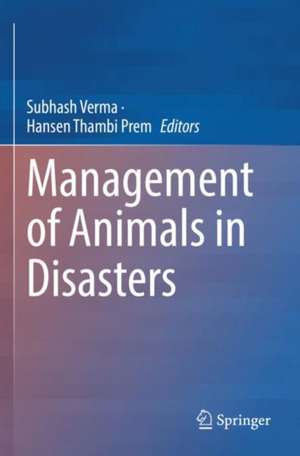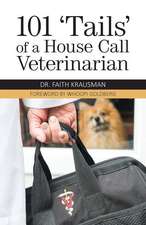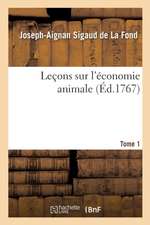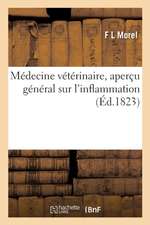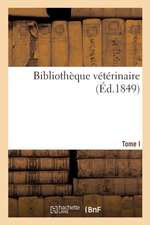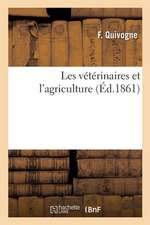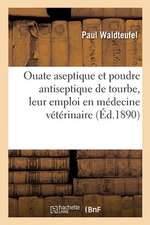Management of Animals in Disasters
Editat de Subhash Verma, Hansen Thambi Premen Limba Engleză Paperback – 12 mai 2023
| Toate formatele și edițiile | Preț | Express |
|---|---|---|
| Paperback (1) | 1412.71 lei 6-8 săpt. | |
| Springer Nature Singapore – 12 mai 2023 | 1412.71 lei 6-8 săpt. | |
| Hardback (1) | 1418.95 lei 6-8 săpt. | |
| Springer Nature Singapore – 11 mai 2022 | 1418.95 lei 6-8 săpt. |
Preț: 1412.71 lei
Preț vechi: 1487.06 lei
-5% Nou
Puncte Express: 2119
Preț estimativ în valută:
270.31€ • 282.99$ • 223.67£
270.31€ • 282.99$ • 223.67£
Carte tipărită la comandă
Livrare economică 05-19 aprilie
Preluare comenzi: 021 569.72.76
Specificații
ISBN-13: 9789811693946
ISBN-10: 9811693943
Ilustrații: XVII, 301 p. 1 illus.
Dimensiuni: 155 x 235 mm
Greutate: 0.49 kg
Ediția:1st ed. 2022
Editura: Springer Nature Singapore
Colecția Springer
Locul publicării:Singapore, Singapore
ISBN-10: 9811693943
Ilustrații: XVII, 301 p. 1 illus.
Dimensiuni: 155 x 235 mm
Greutate: 0.49 kg
Ediția:1st ed. 2022
Editura: Springer Nature Singapore
Colecția Springer
Locul publicării:Singapore, Singapore
Cuprins
Chapters 1_Types of Disasters. - Chapters 2_Principles of Disaster Management. - Chapters 3_Early warning systems, disease management and biosecurity in disasters. - Chapters 4_Disaster Risk Assessment and Operations Planning. - Chapters 5_Data Collection and Management. - Chapters 6_Data Collection and Management - Chapters 7_ Deployment and post-intervention responsibilities of the veterinary emergency response unit. - Chapters 8_Disaster Risk Reduction and Preparedness Planning. - Chapters 9_Post disaster interventions related to livestock and livelihood. - Chapters 10_Climate changes, its effects and mitigation strategies in animals. - Chapters 11_Animal Welfare and Livestock Related Responses during Disasters. - Chapters 12_Feeding Strategies of Livestock during Natural Disasters. - Chapters 13_Animal Handling and Evacuation in Disaster. - Chapters 14_Handling of pet animals during natural disaster. - Chapters 15_ Welfare and management of birds. - Chapters 16_The Role of Dogs in Search and Rescue. - Chapters 17_First Aid in animals during disaster. - Chapters 18_Essential medicines, feed and other supplies during disaster. - Chapters 19_Emergency animal shelters during disasters. - Chapters 20_Infectious diseases and their management during disasters. - Chapters 21_Disaster response under 'One Health' approach: Contribution of Veterinary Public Health. - Chapters 22_Wildlife rescue during disasters. - Chapters 23_Animal carcass management and disposal during disasters.
Notă biografică
Dr. Subhash Verma is currently a Professor of Veterinary Microbiology and Coordinator of Veterinary Emergency Response Unit (VERU-North Zone) in the Veterinary College at Palampur, Himachal Pradesh, India. He has more than 25 years of professional experience working in various positions. He is also an Associate Editor of Frontiers in Veterinary Science, Veterinary Infectious Diseases. He has earlier served as Head of Department of Fisheries for more than five years. As Coordinator of the VERU, his team is responsible for imparting trainings on management and welfare of animals during emergencies to veterinarians, paravets, and other stakeholders. Dr Verma had earned his Master in Immunopharmacology with distinction from the University of Strathclyde, Glasgow under British Chevening Scholarship in the year 2003. He got an Overseas Research Scholarship for Ph. D in Immunogenetics from the University of Glasgow and later pursued his Postdoctoral research in Wellcome Centre of Molecular Parasitiology until 2008. He is an Associate Fellow of National Academy of Veterinary Sciences, India. His scientific contributions include underpinning the mechanism of antibody diversity in cattle, pioneer work on functional assessment and mapping of cattle activation induced cytidine deaminase, characterization of virulence determinants and development of i-ELISA for P. multocida, and development and characterization of AprV2 nanovaccine against Footrot. He had published more than 80 high quality research papers and written a book, 4 chapters and 3 manuals, deposited more than 40 sequences to GenBank, contributed towards sequencing of 2 viral genomes and submitted about 35 unique microbes to National Centre for Veterinary Type Culture Collection.
Mr. Hansen Thambi Prem works with the FAO Emergency Management Centre for Animal Health (EMC-AH) as the Sub-Regional Assessment Lead for South Asia. He has been working in the humanitarian sector since the 2004 Indian Ocean Tsunami. He is specialized in community development, participatory approaches and international humanitarian standards, such as Sphere Minimum Standards, and Livestock Emergency Guidelines and Standards (LEGS). Before joining FAO, Hansen worked as a Project Manager for World Animal Protection (2011 to 2020) where he was instrumental in engaging with veterinary universities and disaster management authorities to establish and strengthen the Veterinary Emergency Response Units (VERUs) in India (North-Himachal Pradesh, South-Tamil Nadu, East-Assam, West-Gujarat, and Central-Madhya Pradesh). He also regularly trains humanitarian professionals, and government officials, including paramilitary forces such as National Disaster Response Force (NDRF) battalions on the management of animals in emergencies through simulation exercises and capacity building initiatives.
Mr. Hansen Thambi Prem works with the FAO Emergency Management Centre for Animal Health (EMC-AH) as the Sub-Regional Assessment Lead for South Asia. He has been working in the humanitarian sector since the 2004 Indian Ocean Tsunami. He is specialized in community development, participatory approaches and international humanitarian standards, such as Sphere Minimum Standards, and Livestock Emergency Guidelines and Standards (LEGS). Before joining FAO, Hansen worked as a Project Manager for World Animal Protection (2011 to 2020) where he was instrumental in engaging with veterinary universities and disaster management authorities to establish and strengthen the Veterinary Emergency Response Units (VERUs) in India (North-Himachal Pradesh, South-Tamil Nadu, East-Assam, West-Gujarat, and Central-Madhya Pradesh). He also regularly trains humanitarian professionals, and government officials, including paramilitary forces such as National Disaster Response Force (NDRF) battalions on the management of animals in emergencies through simulation exercises and capacity building initiatives.
Textul de pe ultima copertă
This book is a comprehensive guide for veterinary and humanitarian professionals to plan emergency responses for the care and welfare of animals. It covers various topics on disasters, such as principles of disaster management, operation planning, team deployment, etc., from the perspective of saving both livestock and the livelihood of vulnerable communities. The book also discusses the importance of early warning systems, biosecurity, techniques for data collection, one health approach, climate change, and appropriate mitigation strategies. It highlights different principles, approaches, and guidelines related to the rescue, relief, and management of animals during disasters. It also contains topics on the welfare of birds and the rescue and relief of wild animals. This book includes essential veterinary and life-saving supplies required by the relief providing teams during emergencies such as disasters. The book helps administrators understand the key aspects of welfare and management of animals during disasters and enable them to draft policies focusing on humans and animals’ rescue & welfare and protection of livelihoods. It is an essential guide for veterinarians, humanitarian workers, field functionaries, farmers, disaster response forces personnel, etc., during various types of disasters and emergencies.
Caracteristici
Presents key aspects of principles of disaster management
Management of animals during disasters
Examines infectious diseases of animals and their management during disasters
Management of animals during disasters
Examines infectious diseases of animals and their management during disasters
